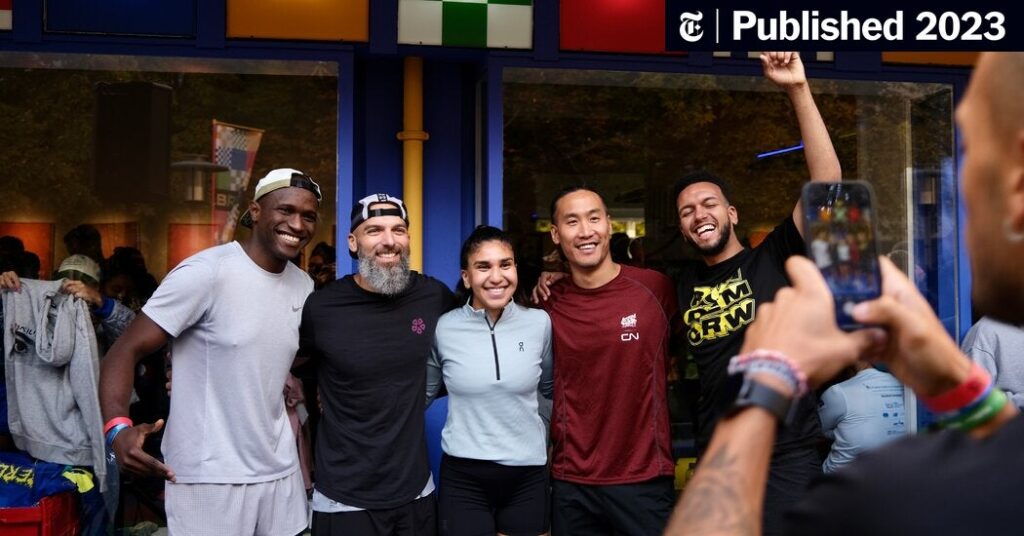The Rise of Social Running Clubs: A New Era of Community and Connection
The Berlin Marathon has emerged not only as a competitive event but also as a vibrant social gathering. Runners from across the globe, including cities like Seoul and Cape Town, descend upon Berlin, often donning bright neon gear and enjoying local brews. While elite athletes vie for record-breaking times, many participants are there primarily for the camaraderie and celebration surrounding the event.
In recent years, Berlin has positioned itself as a hub for social running clubs, drawing enthusiasts interested in more than just the physical aspect of running. As part of the marathon festivities, groups engage in various activities, from dancing to DJ sets to exploring local art galleries. Post-run brunches and energetic cheers from club members cheering on their fellow runners along the route foster a vibrant, communal atmosphere reminiscent of American tailgates.
Ainoa Ryll, a 33-year-old runner from Barcelona, reflected on this phenomenon, noting that “it takes over the city” and encapsulates the growing trend of making running a social event. As highlighted in recent reports, running clubs are gaining popularity in major cities worldwide, including London, Los Angeles, Houston, and New York, as people seek to combat feelings of isolation in bustling urban environments. These running communities have proven invaluable in forging connections among their members, sparking friendships and even romantic relationships.
Transforming Running from Solitary to Social
Joey Elgersma, founder of the Berlin Braves, remarked on the evolving perception of running, stating, “Running was once seen as a nerdy, solo sport. These clubs are showing how cool and social it can be.” The surge in popularity for running clubs can be traced back to the COVID-19 pandemic, when individuals began to seek safe avenues for exercise and social interaction. Justin Shields, who founded the Venice Run Club in Los Angeles during the pandemic, experienced this shift firsthand.
The Venice Run Club quickly gained traction, growing into one of the largest running communities globally, with attendance at events soaring to over 1,000 participants. “I understand how hard it is to make friends now,” Shields shared. “I want to help people make a real connection.” By implementing practices like encouraging newcomers to introduce themselves at the start of each run, the club fosters a welcoming atmosphere conducive to building friendships.
Bonding through Vulnerability and Shared Experiences
Running clubs have a unique way of bringing people together through shared experiences and vulnerability. According to Matt Horrocks, co-founder of the Your Friendly Runners club in London, “We’ve found that people bond really, really quickly.” The physical exertion and challenges involved in running often expose members to their most genuine selves—sweaty, tired, and occasionally struggling—which can lead to authentic connections.
Ryo Yamamoto, a creative director and co-founder of the Old Man Run Club in New York, recounted a time when their community rallied around a member facing health challenges, demonstrating the support and solidarity that these groups can provide. Erin Shields, from the Venice Run Club, likened the sense of belonging she found in her running group to that from her church community. “The run club gives you that, too,” she expressed, highlighting the emotional safety and encouragement found within these social circles.
Conclusion: The Enduring Impact of Running Clubs
As running clubs continue to grow in popularity worldwide, their impact on communities becomes increasingly evident. This shift towards social running has created an inclusive space where individuals can foster friendships, build support networks, and improve their mental well-being, particularly in the aftermath of the isolation experienced during the pandemic. They not only redefine the perception of running as a solitary activity but also demonstrate the power of shared experiences in fostering meaningful connections.
For those interested in joining a running club, resources are widely available online, allowing newcomers to find local groups that cater to various interests and abilities. This movement towards creating life-enhancing connections through running is a testament to the human desire for companionship, and as seen in the Berlin Marathon, it transforms not just the sport but the very fabric of urban communities.
